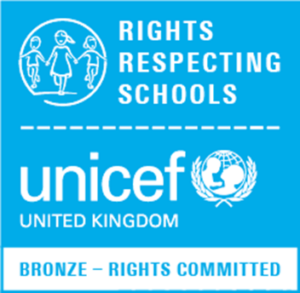Rights Respecting Schools awards
|
What is the Rights Respecting Schools Award? The Rights Respecting Schools Award puts children’s rights at the heart of school. Unicef works with schools in the UK to create safe and inspiring places to learn, where children are respected, their talents are nurtured, and they are able to thrive. Our Rights Respecting Schools Award embeds these values in daily school life and gives children the best chance to lead happy, healthy lives and to be responsible, active citizens. Use the attached document here showing the rights of the child Summary-of-the-UNCRC |
 |
Using the UN Convention on the Rights of the Child (UNCRC) as our guide, we are working with Unicef on a journey to become fully Rights Respecting. We have currently achieved the Bronze level award (Rights Committed) and our next step is to work towards our Silver award (Rights Aware). The Award recognises the school’s achievement in putting the United Nations Convention on the Rights of the Child into practice within the school and beyond.
What is the focus of the Award? The Award is based on principles of equality, dignity, respect, non-discrimination and participation. The initiative started in 2006 and schools involved in the Award have reported a positive impact on relationships and wellbeing, leading to better learning and behaviour, improved academic standards and less bullying.
What does the Award involve?
For the Rights Respecting Schools Award we will work towards the recognition that we have embedded children and young people’s rights into our school’s practice and ethos. We are required to implement three evidence-based strands that cover the leadership of the school, knowledge and understanding of children’s rights, ethos and relationships and the empowerment of children and young people.
There are three levels to the Award:
The journey to Gold: Rights Respecting, the highest stage of the Award granted by Unicef UK, can take three to four years.
What makes the United Nations Convention on the Rights of the Child so special? The Convention has 54 articles that cover all aspects of a child’s life and set out the civil, political, economic, social and cultural rights that all children everywhere are entitled to. It also explains how adults and governments must work together to make sure all children can enjoy all their rights. Every child has rights, whatever their ethnicity, gender, religion, language, abilities or any other status. The Convention must be understood as a whole: all rights are linked and no right is more important than another. The right to relax and play (article 31) and the right to freedom of expression (article 13) are as important as the right to be safe from violence (article 19) and the right to education (article 28)
Our Rights of the Month


















